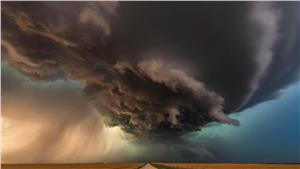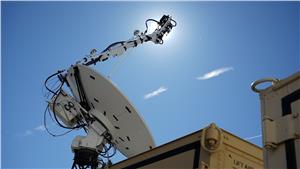Lethal Drones from Yemen Attacked French Frigate in Red Sea - USNI News
![]() Undated photo of the guided-missile frigate FSFrench Navy Photo A French guided-missile frigate came under attack from two lethal drones launched from Yemen, officials in Paris said Monday. On Saturday, two lethal drones fired from Yemen attacked the French guided-missile frigate FS Languedoc (653) while it was operating in the Red Sea, the French Minister of Armed Forces Sébastien Lecornu told the French Senate. "This weekend, two drones coming from Yemen deliberately targeted … our multi-mission frigate Languedoc which was carrying out a patrol in the Red Sea under the authority of the Admiral for the Indian Ocean based in Abu Dhabi," he said. Lecornu told the Senate the ship downed the two drones with guided missiles. "These were Aster 15 missiles which were launched, in self-defense to destroy the two drones. This was done [successfully] and therefore protected the boat and the crew alike," he said. The attack on the French ship comes as Iran-backed Houthi forces in Yemen continue to attack ships in the Red Sea, arguing the vessels are connected to Israel. Yahya Sare'e, the spokesman for the Houthi military, released a series of posts on X, the site formerly known as Twitter, on Saturday saying Yemen would block all ships that head to or from Israel and issued a warning to mariners. Meanwhile, Israeli National Security Adviser Tzachi Hanegbi said Jerusalem is considering options to protect Israeli interests for merchant shipping, according to CNN. "Israel is giving the world some time to organize in order to prevent this but if there isn't to be a global arrangement because it is a global issue, we will act in order to remove this naval siege," Hanegbi said. Last week, White House officials said they were working to create an international force to tamp down attacks. As of Monday, Pentagon Press Secretary Maj. Gen. Patrick Ryder did not have any updates on a joint maritime task force that the U.S. and allies could possibly form to help protect commercial ships in the Red Sea. "We've talked about the importance of preventing a wider regional conflict. And so we will continue to do that, working with the Israelis and other partners in the region," Ryder said on Monday. John Kirby, the spokesman for the National Security Council, told reporters last week that the State and Defense departments are working to strengthen the Combined Maritime Forces, which includes 39 partners and is headquartered in Bahrain alongside U.S. 5th Fleet. "Our focus at this time is ensuring that there are sufficient military assets in place to deter these Houthi threats to maritime trade in the Red Sea and in the surrounding waters to the global economy writ large," Kirby said. The White House said the group would be under Combined Task Force 153. CTF-153 is an existing group that's run by the Combined Maritime Forces partnership and tasked with Red Sea security. The CTF was established last year and has been commanded by both U.S. and Egyptian commanders. Expanding Red Sea security comes as the Houthis have launched multiple drones at ships in the Red Sea, the Houthis have claimed are Israeli-linked. This includes M/V Unity Explorer, which sent out a distress call after being attacked by drones launched from Houthi-controlled areas, USNI News reported. Five Somali pirates attacked M/V Central Park, which was connected to an Israeli businessman. The individuals attempted to flee toward Yemen, but the Department of Defense said initial indications have not revealed the pirates had connections with Houthis. In his posts, Sare'e said that the success of the attacks on the commercial ships encouraged the Houthis to expand to block any commercial ship heading to or from Israel. Despite multiple American warships shooting down both Houthi-launched drones and cruise missiles, officials have said that U.S. ships weren't the obvious targets of the weapons. "We're not in an armed conflict with the Houthis. We have seen drones and missiles shot from Houthi-controlled areas within Yemen," Deputy Pentagon Press Secretary Sabrina Singh told reporters Thursday. "Not necessarily targeting our ships but of course targeting most likely commercial vessels that are transiting through the Red Sea. And so part of why we are in the region is to bolster our deterrence but to also ensure the free passageway of commercial ships that are transiting through one of the most vital waterways in the world."
Undated photo of the guided-missile frigate FSFrench Navy Photo A French guided-missile frigate came under attack from two lethal drones launched from Yemen, officials in Paris said Monday. On Saturday, two lethal drones fired from Yemen attacked the French guided-missile frigate FS Languedoc (653) while it was operating in the Red Sea, the French Minister of Armed Forces Sébastien Lecornu told the French Senate. "This weekend, two drones coming from Yemen deliberately targeted … our multi-mission frigate Languedoc which was carrying out a patrol in the Red Sea under the authority of the Admiral for the Indian Ocean based in Abu Dhabi," he said. Lecornu told the Senate the ship downed the two drones with guided missiles. "These were Aster 15 missiles which were launched, in self-defense to destroy the two drones. This was done [successfully] and therefore protected the boat and the crew alike," he said. The attack on the French ship comes as Iran-backed Houthi forces in Yemen continue to attack ships in the Red Sea, arguing the vessels are connected to Israel. Yahya Sare'e, the spokesman for the Houthi military, released a series of posts on X, the site formerly known as Twitter, on Saturday saying Yemen would block all ships that head to or from Israel and issued a warning to mariners. Meanwhile, Israeli National Security Adviser Tzachi Hanegbi said Jerusalem is considering options to protect Israeli interests for merchant shipping, according to CNN. "Israel is giving the world some time to organize in order to prevent this but if there isn't to be a global arrangement because it is a global issue, we will act in order to remove this naval siege," Hanegbi said. Last week, White House officials said they were working to create an international force to tamp down attacks. As of Monday, Pentagon Press Secretary Maj. Gen. Patrick Ryder did not have any updates on a joint maritime task force that the U.S. and allies could possibly form to help protect commercial ships in the Red Sea. "We've talked about the importance of preventing a wider regional conflict. And so we will continue to do that, working with the Israelis and other partners in the region," Ryder said on Monday. John Kirby, the spokesman for the National Security Council, told reporters last week that the State and Defense departments are working to strengthen the Combined Maritime Forces, which includes 39 partners and is headquartered in Bahrain alongside U.S. 5th Fleet. "Our focus at this time is ensuring that there are sufficient military assets in place to deter these Houthi threats to maritime trade in the Red Sea and in the surrounding waters to the global economy writ large," Kirby said. The White House said the group would be under Combined Task Force 153. CTF-153 is an existing group that's run by the Combined Maritime Forces partnership and tasked with Red Sea security. The CTF was established last year and has been commanded by both U.S. and Egyptian commanders. Expanding Red Sea security comes as the Houthis have launched multiple drones at ships in the Red Sea, the Houthis have claimed are Israeli-linked. This includes M/V Unity Explorer, which sent out a distress call after being attacked by drones launched from Houthi-controlled areas, USNI News reported. Five Somali pirates attacked M/V Central Park, which was connected to an Israeli businessman. The individuals attempted to flee toward Yemen, but the Department of Defense said initial indications have not revealed the pirates had connections with Houthis. In his posts, Sare'e said that the success of the attacks on the commercial ships encouraged the Houthis to expand to block any commercial ship heading to or from Israel. Despite multiple American warships shooting down both Houthi-launched drones and cruise missiles, officials have said that U.S. ships weren't the obvious targets of the weapons. "We're not in an armed conflict with the Houthis. We have seen drones and missiles shot from Houthi-controlled areas within Yemen," Deputy Pentagon Press Secretary Sabrina Singh told reporters Thursday. "Not necessarily targeting our ships but of course targeting most likely commercial vessels that are transiting through the Red Sea. And so part of why we are in the region is to bolster our deterrence but to also ensure the free passageway of commercial ships that are transiting through one of the most vital waterways in the world."

 Undated photo of the guided-missile frigate FSFrench Navy Photo A French guided-missile frigate came under attack from two lethal drones launched from Yemen, officials in Paris said Monday. On Saturday, two lethal drones fired from Yemen attacked the French guided-missile frigate FS Languedoc (653) while it was operating in the Red Sea, the French Minister of Armed Forces Sébastien Lecornu told the French Senate. "This weekend, two drones coming from Yemen deliberately targeted … our multi-mission frigate Languedoc which was carrying out a patrol in the Red Sea under the authority of the Admiral for the Indian Ocean based in Abu Dhabi," he said. Lecornu told the Senate the ship downed the two drones with guided missiles. "These were Aster 15 missiles which were launched, in self-defense to destroy the two drones. This was done [successfully] and therefore protected the boat and the crew alike," he said. The attack on the French ship comes as Iran-backed Houthi forces in Yemen continue to attack ships in the Red Sea, arguing the vessels are connected to Israel. Yahya Sare'e, the spokesman for the Houthi military, released a series of posts on X, the site formerly known as Twitter, on Saturday saying Yemen would block all ships that head to or from Israel and issued a warning to mariners. Meanwhile, Israeli National Security Adviser Tzachi Hanegbi said Jerusalem is considering options to protect Israeli interests for merchant shipping, according to CNN. "Israel is giving the world some time to organize in order to prevent this but if there isn't to be a global arrangement because it is a global issue, we will act in order to remove this naval siege," Hanegbi said. Last week, White House officials said they were working to create an international force to tamp down attacks. As of Monday, Pentagon Press Secretary Maj. Gen. Patrick Ryder did not have any updates on a joint maritime task force that the U.S. and allies could possibly form to help protect commercial ships in the Red Sea. "We've talked about the importance of preventing a wider regional conflict. And so we will continue to do that, working with the Israelis and other partners in the region," Ryder said on Monday. John Kirby, the spokesman for the National Security Council, told reporters last week that the State and Defense departments are working to strengthen the Combined Maritime Forces, which includes 39 partners and is headquartered in Bahrain alongside U.S. 5th Fleet. "Our focus at this time is ensuring that there are sufficient military assets in place to deter these Houthi threats to maritime trade in the Red Sea and in the surrounding waters to the global economy writ large," Kirby said. The White House said the group would be under Combined Task Force 153. CTF-153 is an existing group that's run by the Combined Maritime Forces partnership and tasked with Red Sea security. The CTF was established last year and has been commanded by both U.S. and Egyptian commanders. Expanding Red Sea security comes as the Houthis have launched multiple drones at ships in the Red Sea, the Houthis have claimed are Israeli-linked. This includes M/V Unity Explorer, which sent out a distress call after being attacked by drones launched from Houthi-controlled areas, USNI News reported. Five Somali pirates attacked M/V Central Park, which was connected to an Israeli businessman. The individuals attempted to flee toward Yemen, but the Department of Defense said initial indications have not revealed the pirates had connections with Houthis. In his posts, Sare'e said that the success of the attacks on the commercial ships encouraged the Houthis to expand to block any commercial ship heading to or from Israel. Despite multiple American warships shooting down both Houthi-launched drones and cruise missiles, officials have said that U.S. ships weren't the obvious targets of the weapons. "We're not in an armed conflict with the Houthis. We have seen drones and missiles shot from Houthi-controlled areas within Yemen," Deputy Pentagon Press Secretary Sabrina Singh told reporters Thursday. "Not necessarily targeting our ships but of course targeting most likely commercial vessels that are transiting through the Red Sea. And so part of why we are in the region is to bolster our deterrence but to also ensure the free passageway of commercial ships that are transiting through one of the most vital waterways in the world."
Undated photo of the guided-missile frigate FSFrench Navy Photo A French guided-missile frigate came under attack from two lethal drones launched from Yemen, officials in Paris said Monday. On Saturday, two lethal drones fired from Yemen attacked the French guided-missile frigate FS Languedoc (653) while it was operating in the Red Sea, the French Minister of Armed Forces Sébastien Lecornu told the French Senate. "This weekend, two drones coming from Yemen deliberately targeted … our multi-mission frigate Languedoc which was carrying out a patrol in the Red Sea under the authority of the Admiral for the Indian Ocean based in Abu Dhabi," he said. Lecornu told the Senate the ship downed the two drones with guided missiles. "These were Aster 15 missiles which were launched, in self-defense to destroy the two drones. This was done [successfully] and therefore protected the boat and the crew alike," he said. The attack on the French ship comes as Iran-backed Houthi forces in Yemen continue to attack ships in the Red Sea, arguing the vessels are connected to Israel. Yahya Sare'e, the spokesman for the Houthi military, released a series of posts on X, the site formerly known as Twitter, on Saturday saying Yemen would block all ships that head to or from Israel and issued a warning to mariners. Meanwhile, Israeli National Security Adviser Tzachi Hanegbi said Jerusalem is considering options to protect Israeli interests for merchant shipping, according to CNN. "Israel is giving the world some time to organize in order to prevent this but if there isn't to be a global arrangement because it is a global issue, we will act in order to remove this naval siege," Hanegbi said. Last week, White House officials said they were working to create an international force to tamp down attacks. As of Monday, Pentagon Press Secretary Maj. Gen. Patrick Ryder did not have any updates on a joint maritime task force that the U.S. and allies could possibly form to help protect commercial ships in the Red Sea. "We've talked about the importance of preventing a wider regional conflict. And so we will continue to do that, working with the Israelis and other partners in the region," Ryder said on Monday. John Kirby, the spokesman for the National Security Council, told reporters last week that the State and Defense departments are working to strengthen the Combined Maritime Forces, which includes 39 partners and is headquartered in Bahrain alongside U.S. 5th Fleet. "Our focus at this time is ensuring that there are sufficient military assets in place to deter these Houthi threats to maritime trade in the Red Sea and in the surrounding waters to the global economy writ large," Kirby said. The White House said the group would be under Combined Task Force 153. CTF-153 is an existing group that's run by the Combined Maritime Forces partnership and tasked with Red Sea security. The CTF was established last year and has been commanded by both U.S. and Egyptian commanders. Expanding Red Sea security comes as the Houthis have launched multiple drones at ships in the Red Sea, the Houthis have claimed are Israeli-linked. This includes M/V Unity Explorer, which sent out a distress call after being attacked by drones launched from Houthi-controlled areas, USNI News reported. Five Somali pirates attacked M/V Central Park, which was connected to an Israeli businessman. The individuals attempted to flee toward Yemen, but the Department of Defense said initial indications have not revealed the pirates had connections with Houthis. In his posts, Sare'e said that the success of the attacks on the commercial ships encouraged the Houthis to expand to block any commercial ship heading to or from Israel. Despite multiple American warships shooting down both Houthi-launched drones and cruise missiles, officials have said that U.S. ships weren't the obvious targets of the weapons. "We're not in an armed conflict with the Houthis. We have seen drones and missiles shot from Houthi-controlled areas within Yemen," Deputy Pentagon Press Secretary Sabrina Singh told reporters Thursday. "Not necessarily targeting our ships but of course targeting most likely commercial vessels that are transiting through the Red Sea. And so part of why we are in the region is to bolster our deterrence but to also ensure the free passageway of commercial ships that are transiting through one of the most vital waterways in the world." 







